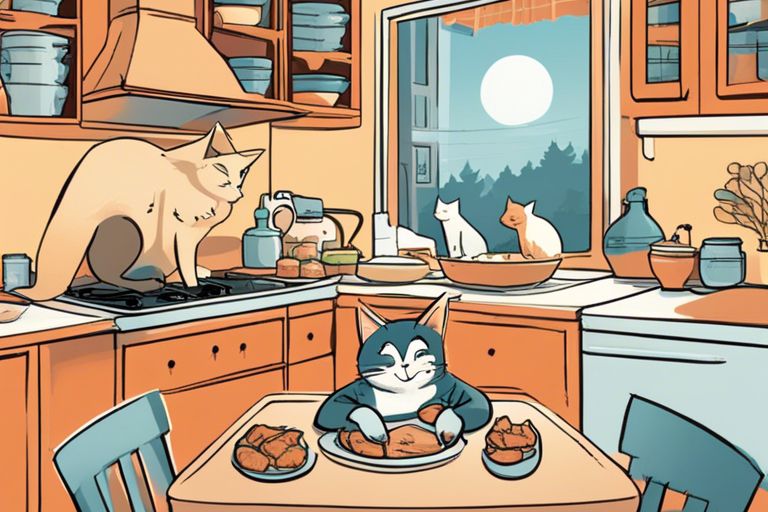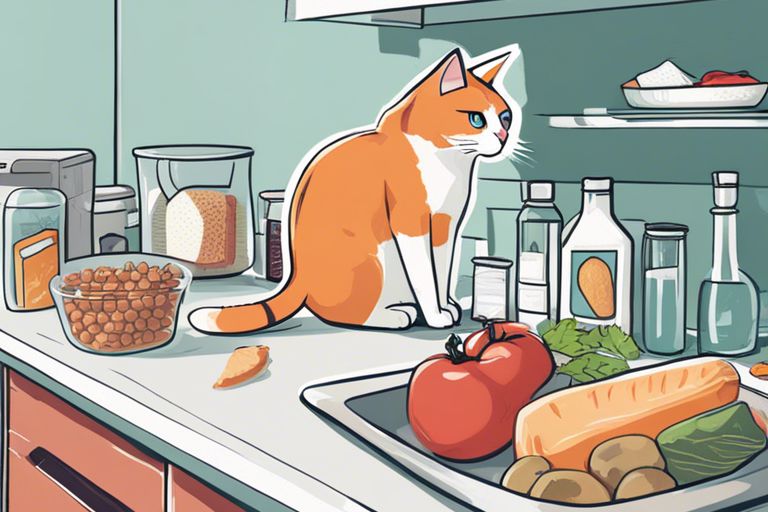Have you ever wondered if it’s safe for your feline friend to indulge in some of your favorite human foods? While some human foods can be harmful to your cat’s health, others can actually provide nutritional benefits. It’s important to know which foods are safe and which ones should be avoided at all costs to ensure the well-being of your beloved pet. In this blog post, we will discuss the potential dangers of certain human foods for cats, as well as provide a list of safe and healthy alternatives that you can offer to your furry companion.
Key Takeaways:
- Certain human foods are safe for cats: Some human foods, such as lean meats, fish, and certain fruits and vegetables, can be given to cats in moderation and can provide them with important nutrients.
- Avoid toxic human foods: There are many human foods that are toxic to cats, including chocolate, grapes, and onions, that should never be given to them as they can be harmful or even fatal.
- Always consult with a veterinarian: Before introducing any new human foods to your cat’s diet, it is important to consult with a veterinarian to ensure their safety and suitability for your cat’s specific dietary needs.
The Feline Digestive System
Any responsible pet owner should be aware of the unique digestive system of their feline friend. Understanding how your cat’s digestive system works is crucial when it comes to making informed decisions about what they can safely eat.
Anatomical and Physiological Overview
The digestive system of a cat is designed to process meat-based diets. The structure of their jaws, teeth, and digestive tract is well-suited for tearing and digesting raw meat. Unlike humans, cats lack the necessary enzymes to break down certain carbohydrates, making it difficult for them to digest plant-based foods.
Key Differences from Humans
One of the most significant differences between the digestive systems of cats and humans is the presence of certain key enzymes. Cats lack the enzyme necessary to break down plant matter efficiently, which is why a diet high in fruits and vegetables can be detrimental to their health. Additionally, cats have a relatively short digestive tract, which is optimized for quickly processing animal protein and fat.
Safe and Nutritious Human Foods for Cats
Some human foods can be safe and nutritious for your cat to eat. Offering your cat certain human foods can add variety to their diet and provide additional nutrients. However, it’s important to be aware of which foods are safe for your cat to consume and which ones can be harmful. In this chapter, we’ll explore some safe and nutritious options for your feline friend.
Protein-Rich Foods
Cats are obligate carnivores, which means that they require a diet rich in high-quality animal protein to thrive. Many human foods that are rich in protein, such as cooked chicken, turkey, or lean beef, can be safe for your cat to eat. These protein-rich foods can provide essential amino acids that contribute to your cat’s overall health and well-being. However, it’s important to avoid feeding your cat raw meat or meat that has been seasoned with onions, garlic, or other spices, as these can be harmful to their digestive system.
Vegetables and Fruits Cats Can Eat
While cats are primarily carnivorous, some vegetables and fruits can provide additional nutrients and fiber to your cat’s diet. Cooked vegetables such as carrots, green beans, and peas can be safe for your cat to consume in small amounts. Fruits such as blueberries, bananas, and watermelon can also be given as an occasional treat. However, it’s important to remember that cats have different dietary needs than humans, and these foods should only be offered in moderation as part of a balanced diet that includes high-quality cat food.
Potentially Harmful Human Foods
For your cat’s safety, it’s important to be aware of the human foods that can be potentially harmful to them. While some foods are safe for your cat to eat, others can be toxic or cause digestive issues.
Toxic Foods for Cats
There are certain human foods that can be toxic to cats and should be avoided at all costs. These include chocolate, onions, garlic, grapes, raisins, and xylitol (an artificial sweetener). These foods can cause a range of symptoms in cats, from gastrointestinal upset to more severe issues like kidney failure and even death. It’s important to keep these foods out of your cat’s reach and to never intentionally feed them to your pet.
Foods That Can Cause Digestive Issues
Some human foods, while not necessarily toxic, can still cause digestive issues for your cat. Foods high in fat, such as bacon, sausage, and fried food, can lead to pancreatitis in cats. Additionally, dairy products such as milk and cheese can be difficult for some cats to digest and may cause gastrointestinal upset. It’s best to avoid feeding these types of foods to your cat to prevent any potential digestive issues.
Best Practices for Feeding Your Cat Human Foods
To ensure the safety of your feline friend, there are certain best practices you should follow when feeding them human foods. By adhering to these guidelines, you can help prevent any potential harm to your cat and ensure they receive the necessary nutrients for good health.
Quantity and Frequency Considerations
When it comes to feeding your cat human foods, moderation is key. While some human foods can be safe for cats in small amounts, overindulgence can lead to various health issues. It is important to remember that cats have different nutritional requirements than humans, so any human foods should only be given as occasional treats. Limit the quantity and frequency of human food offerings, and stick to primarily feeding your cat a balanced commercial cat food diet.
The Importance of a Balanced Diet
Feeding your cat human foods should never replace a balanced, nutritious diet specifically formulated for felines. Commercial cat food is designed to meet the dietary needs of cats, providing the right balance of proteins, fats, vitamins, and minerals essential for their overall health. While some human foods can supplement a cat’s diet, they should not be relied upon as the primary source of nutrition. It’s crucial to ensure that your cat’s diet is well-balanced and meets their specific nutritional requirements to promote optimal health and well-being.

Conclusion
Now that you have learned about the dangers of certain human foods for cats, it is important to be cautious about what you feed your feline friend. While some human foods are safe in moderation, others can be toxic and even life-threatening for your cat. It’s always best to stick to a diet specifically formulated for cats and consult with a veterinarian before introducing any new foods into your pet’s diet. Remember, your cat’s health and well-being should be your top priority, so always err on the side of caution when it comes to feeding them human foods.














